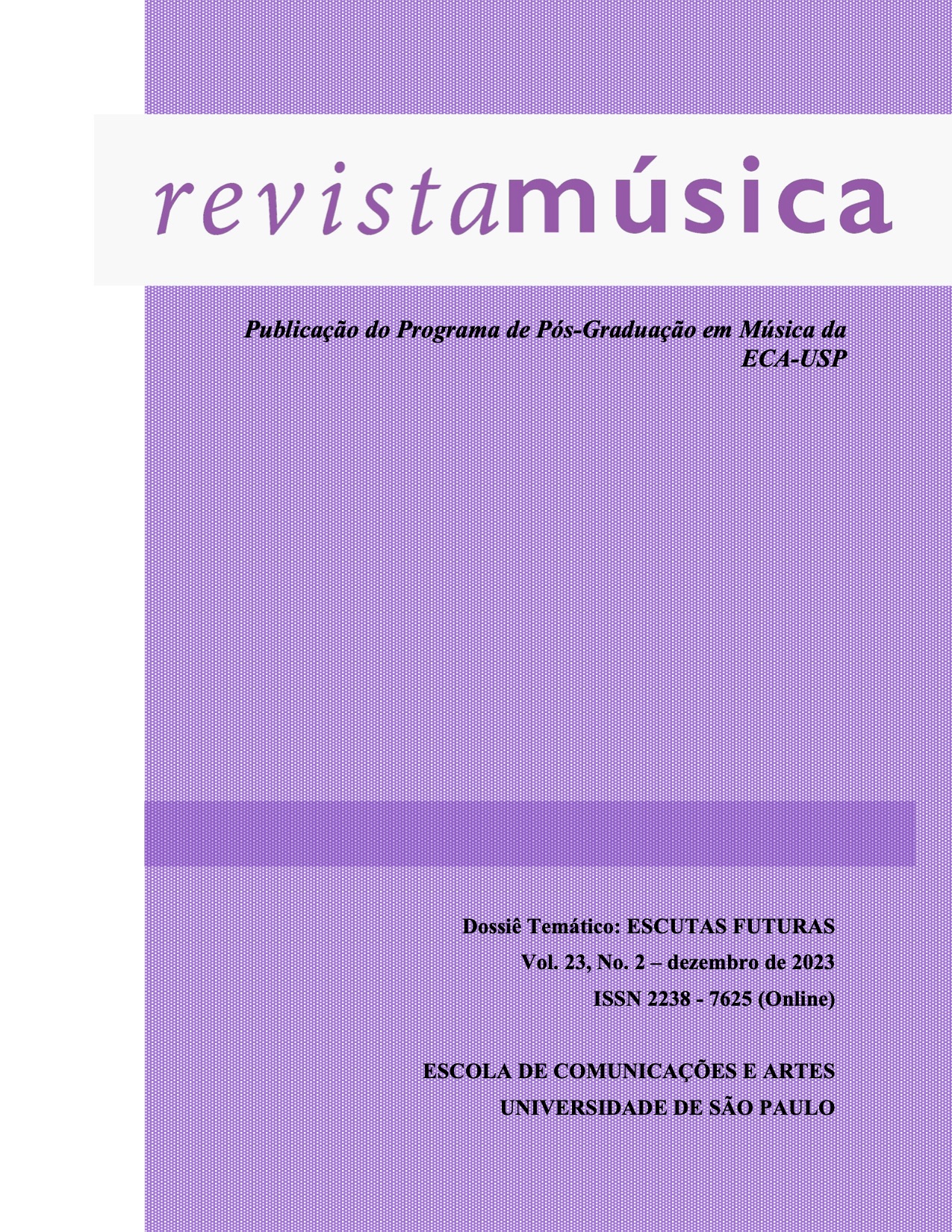Three composers in Latin America: interviews with Javier Álvarez, Tatiana Catanzaro and Germán Toro Pérez.
DOI:
https://doi.org/10.11606/rm.v23i2.216076Keywords:
contemporary music, decoloniality, Latin American music, electroacoustic musicAbstract
The present article was carried out with the support of the Research Stays Program of the Autonomous University of Mexico 2023 and aims to present a series of dialogues held with two male composers and one female composer from Latin America. These critical interviews do not intend to cover all aspects of their work but rather to reflect on their body of work, their formative years, the paths they have taken as creators, and so on. The interviews were conducted under different circumstances and are part of a larger project that seeks to reflect on the landscape of musical composition in Latin America. The composers selected for this work are: Javier Álvarez, Tatiana Catanzaro, and Germán Toro Pérez.
Downloads
References
Castro-Gómez, S. (2007). "Decolonizar la universidad. La hybris del punto cero y el diálogo de saberes." El giro decolonial. Reflexiones para una diversidad epistémica más allá del capitalismo global: 79-91.
Maldonado-Torres, N. (2007). "Sobre la colonialidad del ser: contribuciones al desarrollo de un concepto." El giro decolonial. Reflexiones para una diversidad epistémica más allá del capitalismo global: 127-167.
Melendi, M. A. (2012). "Aqui é arte: Paulo Nazareth." Nazareth, Paulo. Arte contemporânea/LTDA. Rio de Janeiro: Cobogó.
Mignolo, W. (2008). "Desobediência epistêmica: a opção descolonial e o significado de identidade em política." Cadernos de Letras da UFF 34(1): 287-324.
Oliveira, L. F. d. and V. M. F. Candau (2010). "Pedagogia decolonial e educação antirracista e intercultural no Brasil." Educação em revista 26(01): 15-40.
Quijano, A. (2000). Colonialidad del poder, eurocentrismo y América Latina, clacso Buenos Aires.
Restrepo, E. and A. A. R. Martínez (2010). Inflexión decolonial: fuentes, conceptos y cuestionamientos, Universidad del Cauca Popayán.
Santos, B. d. S. (2007). "Para além do pensamento abissal: das linhas globais a uma ecologia de saberes." Novos estudos CEBRAP: 71-94.
Santos, B. d. S. (2018). Justicia entre saberes: Epistemologías del Sur contra el epistemicidio, Ediciones Morata.
Schacherreiter, J. (2009). "Un mundo donde quepan muchos mundos: A postcolonial legal perspective inspired by the Zapatistas." Global Jurist 9(2): 20122010.
Downloads
Published
Issue
Section
License
Copyright (c) 2023 Daniel Quaranta, Francisco Colasanto

This work is licensed under a Creative Commons Attribution-NonCommercial-ShareAlike 4.0 International License.
Autores que publicam nesta revista concordam com os seguintes termos:
- Autores mantém os direitos autorais e concedem à revista o direito de primeira publicação, com o trabalho simultaneamente licenciado sob a CC Attribution-NonCommercial-ShareAlike 4.0 que permite o compartilhamento do trabalho com reconhecimento da autoria e publicação inicial nesta revista.
- Autores têm autorização para assumir contratos adicionais separadamente, para distribuição não-exclusiva da versão do trabalho publicada nesta revista (ex.: publicar em repositório institucional ou como capítulo de livro), com reconhecimento de autoria e publicação inicial nesta revista.
- Autores têm permissão e são estimulados a publicar e distribuir seu trabalho online (ex.: em repositórios institucionais ou na sua página pessoal) a qualquer ponto antes ou durante o processo editorial, já que isso pode gerar alterações produtivas, bem como aumentar o impacto e a citação do trabalho publicado (Veja O Efeito do Acesso Livre).
How to Cite
Funding data
-
Fundação Carlos Chagas Filho de Amparo à Pesquisa do Estado do Rio de Janeiro
Grant numbers CNE E-26/200.978/2022 (270349) -
Instituto de Ingeniería, Universidad Nacional Autónoma de México,Universidad Nacional Autónoma de México
Grant numbers PREI 2023


